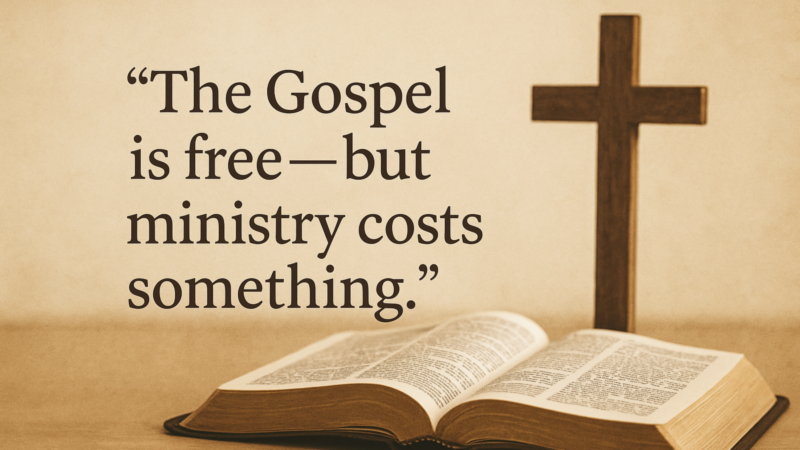The Gospel Is Free - But Ministry Costs Something
Entertainment

Comments
Comment sent successfully!


Introduction
Conversations surrounding the remuneration of Gospel ministers, whether pastors, musicians, or singers, have become increasingly common. Some insist that ministry should always be free of cost, while others argue that labour deserves fair appreciation. Between these two poles lies a much-needed balance.
The Gospel, indeed, is free, a gift of grace offered without price. But the work of ministry, which communicates that Gospel, often comes with a cost that is not merely financial but also personal, emotional, and sacrificial.
The Cost of Excellence
Putting on a ministry event is rarely simple or inexpensive. Venues must be rented, sound systems operated, travel and lodging arranged, and materials prepared. There are unseen hours of rehearsal, prayer, and planning long before anyone steps onto a stage or into a pulpit.
Those who minister with excellence, whether in preaching, music, or leadership, do so because they have spent years refining their gifts. They have studied, trained, and disciplined themselves to ensure that what they offer is not just skillful but spiritually edifying. Excellence costs something.
Therefore, to invite a minister is not to hire a performer but to honour a servant of God whose preparation is itself an act of worship. Compensation, in this light, is not payment for the Gospel, it is recognition of the labour behind the ministry.
Scriptural Perspective on Honour
Scripture is not silent on this matter. Paul reminds the Church that “the labourer is worthy of his hire” (Luke 10:7). Similarly, 1 Timothy 5:17–18 encourages believers to count those who labour in the Word as “worthy of double honour.”
Honour is a Kingdom principle, it extends beyond applause or verbal appreciation. To honour is to recognize value; to give tangible expression to gratitude. When churches and organizations extend fair compensation or an appropriate honorarium, they are not buying ministry, they are affirming the value of faithful service.
Avoiding the Extremes
Of course, balance is essential. There are instances where ministry has been overshadowed by excessive financial expectations, where invitations come with price tags that small congregations cannot afford. Such practices distort the spirit of the Gospel and turn ministry into a marketplace.
Yet, it is equally wrong to assume that ministers should pour out their time, gifts, and personal resources without any acknowledgment or support. Expecting excellence without investment, or sacrifice without appreciation, is unjust. Ministry cannot thrive where dishonour exists.
A Personal Reflection
In my own practice, I do not charge a fixed fee for ministry. I see preaching and teaching as a sacred privilege, not a transaction. However, if I am invited to a paid event, one supported by ticket sales or sponsorships, and my participation is not met with appropriate appreciation, I would graciously decline future invitations.
This position is not rooted in greed but in principle. It’s not about money, it’s about honour, respect, and value. When honour is missing, even the most anointed spaces can feel transactional and hollow.
A Call to Fairness and Grace
Ultimately, this conversation is about stewardship and mutual respect. The Gospel is free, but ministry requires the faithful stewardship of resources and relationships. When churches and ministers operate from a place of grace, transparency, and honour, both sides are blessed.
Let us, therefore, hold these truths together:
About the Author
Dr. Junior W. Smith is a pastor, educator, broadcaster, recording artist, and author dedicated to digital discipleship, spiritual formation, and leadership development. He serves in Toronto, Canada, and is passionate about helping believers integrate faith, honour, and excellence in every sphere of ministry.
